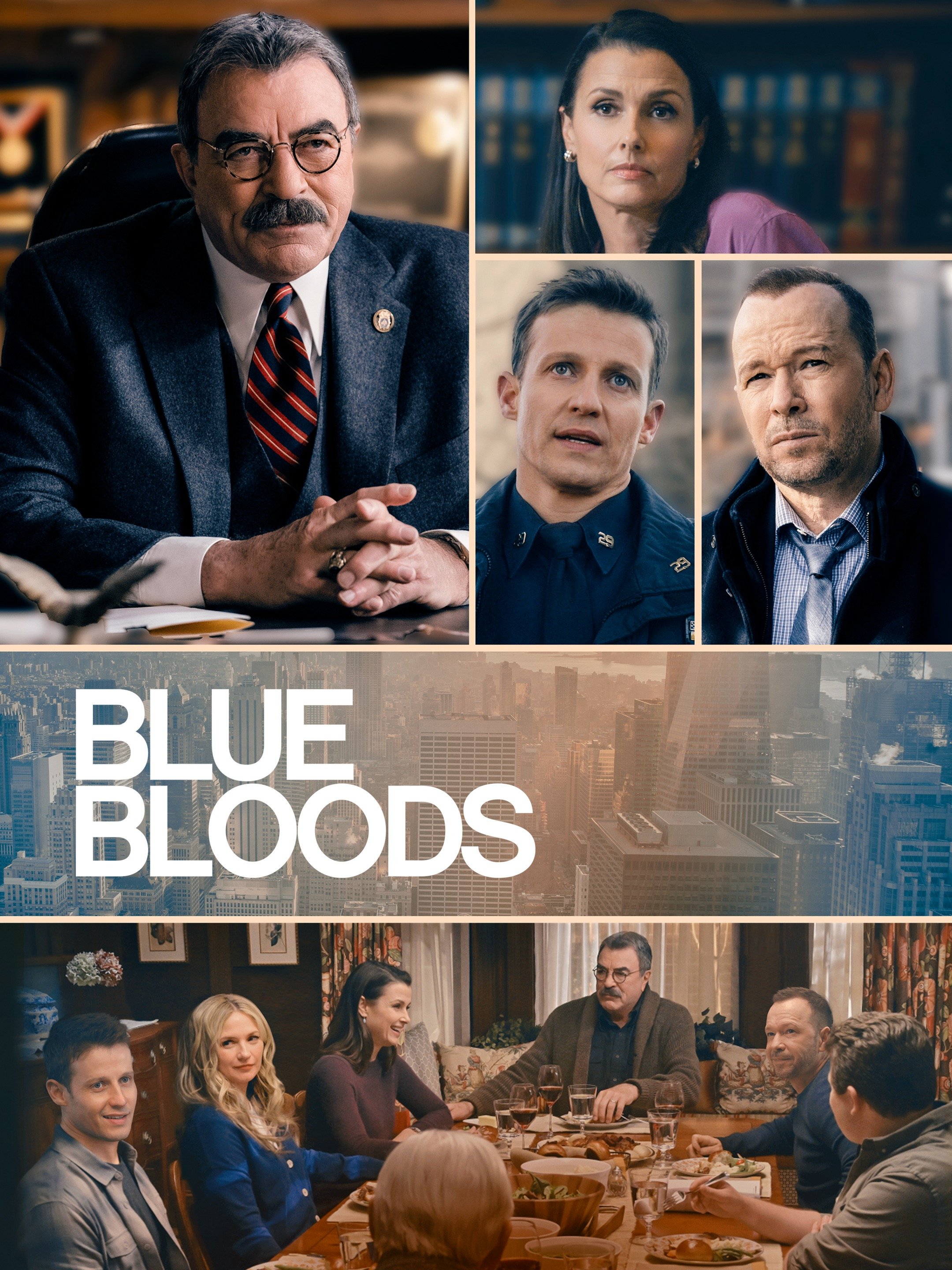Unraveling Blue Bloods: How Many Seasons Did The Reagan Family Reign?
For fans of compelling police procedural dramas and strong family dynamics, few shows have captured hearts quite like Blue Bloods. A common question that arises, especially for those looking to binge-watch or new viewers discovering the series, is precisely how many seasons of Blue Bloods graced our screens. The answer is an impressive 14 seasons, a testament to its enduring popularity and the captivating saga of the Reagan family.
From its premiere in 2010 to its emotional conclusion in 2024, Blue Bloods became a staple of Friday night television, offering a unique blend of crime-solving, ethical dilemmas, and deeply rooted family discussions. This article delves into the show's remarkable run, exploring the full scope of its seasons, episode count, and the legacy it leaves behind.
Table of Contents
- The Definitive Answer: How Many Seasons of Blue Bloods Are There?
- A Legacy Unfolds: Blue Bloods' Impressive Run
- Episode Count: Beyond Just Seasons
- The Reagan Family: Pillars of the Series
- Where to Watch All the Seasons of Blue Bloods
- The End of an Era: Blue Bloods' Farewell
- The Impact and Legacy of Blue Bloods
The Definitive Answer: How Many Seasons of Blue Bloods Are There?
For anyone asking, "How many seasons does Blue Bloods have?" the conclusive answer is 14 seasons. This American police procedural drama television series, which captivated audiences on CBS, ran from its premiere on September 24, 2010, until its final episode aired on December 13, 2024. Over this remarkable span, the show delivered a staggering 293 episodes, each one weaving together the professional challenges and personal lives of the fictional Reagan family, a multi-generational clan predominantly involved in New York City law enforcement.
- Hope Solo Nudes
- Where Is College Gameday This Week
- Barbra Streisand Husband Now
- Did Jimmy Buffett Die
- Kristen Archive
The longevity of Blue Bloods is a significant achievement in the competitive landscape of network television. To sustain a narrative and maintain audience engagement for over a decade and a half speaks volumes about the quality of its writing, the strength of its cast, and the enduring appeal of its core themes. The series finale in December 2024 officially marked the end of this unforgettable era, solidifying its place as one of the longest-running and most beloved dramas in recent memory.
A Legacy Unfolds: Blue Bloods' Impressive Run
The journey of Blue Bloods, spanning from 2010 to 2024, is nothing short of impressive. In an age where television series often struggle to get past a few seasons, Blue Bloods not only survived but thrived, building a loyal fanbase over its extensive run. The show's consistent performance can be attributed to its unique premise: focusing not just on the weekly crime but on the ethical dilemmas and personal sacrifices faced by those who uphold the law, all viewed through the lens of a close-knit, albeit often argumentative, family.
The concept of "many" seasons truly applies here. "Many," as defined, means consisting of or amounting to a large but indefinite number. For a television show, 14 seasons certainly fits this description, setting it apart from the numerous series that conclude after just a handful of years. This extensive duration allowed for deep character development, intricate plot lines, and the exploration of complex societal issues that resonated with viewers. The show's ability to maintain its quality and relevance over such a long period is a testament to its creators and the dedicated team behind it.
- Michael Douglas Cancer
- Cast Of National Lampoons Christmas Vacation
- Christie Digital Systems
- Georges Death On Greys Anatomy
- Dixie Trailer Park
The Journey Through Seasons: Key Milestones
Each season of Blue Bloods brought new challenges and developments for the Reagan family. The show maintained a remarkably consistent release schedule, typically premiering new seasons in the fall. For instance, Season 1 debuted on September 24, 2010, immediately establishing the family dinner as a central and beloved ritual. Following its success, Season 2 premiered on September 23, 2011, continuing to build on the established characters and introducing more nuanced storylines. Season 3 then arrived on September 28, 2012, further cementing the show's place in the Friday night lineup.
This steady annual progression allowed the audience to grow with the characters, witnessing their professional advancements, personal struggles, and the ever-evolving dynamics within the family. Over these many seasons, viewers became intimately familiar with the Reagans, feeling invested in their triumphs and tribulations. The consistent quality across these numerous installments ensured that fans returned year after year, eager to see what new cases and family debates awaited them.
Episode Count: Beyond Just Seasons
While knowing how many seasons of Blue Bloods there are gives a good overview, the sheer volume of content is truly understood when considering the episode count. With a grand total of 293 episodes spread across its 14 seasons, Blue Bloods provided an enormous library of stories for its dedicated viewers. Most seasons typically consisted of 22 to 23 episodes, a standard for network dramas, allowing for a comprehensive exploration of multiple storylines within each annual run.
This high episode count significantly impacted the show's ability to develop its characters and overarching narratives. Unlike shorter cable or streaming series, Blue Bloods had the luxury of time to delve into the intricacies of police work, the legal system, and political maneuvering in New York City. Each episode offered a new case, often reflecting contemporary issues, while simultaneously advancing the personal arcs of Frank, Danny, Erin, Jamie, and the rest of the Reagan clan. The accumulation of nearly 300 episodes means that viewers who embarked on this journey were treated to a truly immersive and long-form storytelling experience, a rare feat in modern television.
The Reagan Family: Pillars of the Series
At the heart of Blue Bloods, and undoubtedly a major factor in its ability to run for so many seasons, is the Reagan family. Led by Tom Selleck as Frank Reagan, the New York City Police Commissioner, the family also includes his eldest son Danny (Donnie Wahlberg), a seasoned detective; his daughter Erin (Bridget Moynahan), an Assistant District Attorney; and his youngest son Jamie (Will Estes), who begins the series as a newly minted police officer. Patriarch Henry Reagan (Len Cariou), a former Police Commissioner himself, provides wisdom and a historical perspective.
The dynamic interplay between these characters, often highlighted during their iconic Sunday family dinners, provided a constant source of drama, debate, and heartwarming moments. Their differing roles within the justice system allowed the show to explore various facets of law enforcement and legal ethics from multiple viewpoints. This unique family structure, where professional and personal lives constantly intersected, offered a rich tapestry for storytelling that kept audiences engaged through numerous seasons.
Evolution of Character Arcs Across Numerous Seasons
The extensive run of Blue Bloods allowed for significant and believable evolution in its characters. Over these numerous seasons, viewers witnessed Jamie Reagan's journey from a Harvard Law graduate who chose to follow in his family's footsteps as a beat cop, eventually rising through the ranks and taking on more responsibility within the NYPD. Danny Reagan, the hot-headed but effective detective, faced personal tragedies and professional triumphs, maturing significantly over the years while never losing his core dedication to justice.
Erin Reagan navigated the complex and often morally ambiguous world of the District Attorney's office, grappling with the compromises and ethical dilemmas inherent in her role, often clashing with her father and brother's more direct law enforcement approaches. Frank, as the Commissioner, continually balanced political pressures with his commitment to his officers and the city's safety, his leadership evolving as society and policing changed. These long-term character arcs, made possible by the show's many seasons, provided depth and relatability, making the Reagans feel like a real family to millions of viewers.
Where to Watch All the Seasons of Blue Bloods
For those eager to dive into the world of the Reagans or revisit their favorite episodes, knowing where to watch all the seasons of Blue Bloods is crucial. At the time of the show's conclusion, Paramount+ emerged as the primary platform for streaming every single episode of the series. Subscribers to Paramount+ can access all 14 seasons, ensuring a complete and uninterrupted viewing experience from the very first episode to the poignant series finale.
While some other platforms might have offered a few select seasons during the show's run, Paramount+ became the definitive home for the entire collection. Additionally, traditional broadcast television networks like ION often air reruns of Blue Bloods, providing another avenue for viewers to catch episodes. However, for comprehensive access to all 293 episodes across all 14 seasons, Paramount+ is the recommended destination, allowing fans to truly immerse themselves in the full scope of the Reagan family's journey.
The End of an Era: Blue Bloods' Farewell
The announcement that Season 14 would be the final chapter for Blue Bloods was met with mixed emotions by its devoted fanbase. While sadness at bidding farewell to beloved characters was palpable, there was also an appreciation for the incredible run the show had enjoyed. The series finale, which aired on December 13, 2024, marked the definitive end of an unforgettable era for the cast, crew, and millions of viewers who had made the Reagan family a part of their weekly routine.
Concluding a series after so many seasons allows for a thoughtful and comprehensive wrap-up of storylines and character arcs. The final season aimed to provide closure for the Reagans, reflecting on their legacy and the impact they had made on the city and each other. The farewell was not just an ending to a television show but a significant moment for a cultural phenomenon that had explored complex themes of duty, justice, and family for well over a decade. The conclusion of Blue Bloods after its impressive 14-season run is a testament to its enduring appeal and its ability to connect with audiences on a deeply personal level.
Why Blue Bloods Resonated for So Many Years
The enduring appeal of Blue Bloods for so many years can be attributed to several key factors that transcended the typical police procedural format. Firstly, its unwavering focus on family, particularly the iconic Sunday dinners, provided a relatable and comforting anchor for viewers. These scenes were not just about food but about philosophical debates, ethical quandaries, and the unconditional love that binds the Reagans, even when they disagreed vehemently. This made the characters feel like an extension of the viewer's own family.
Secondly, the show consistently tackled relevant and often controversial social issues with nuance and respect, allowing for multiple perspectives to be aired through the diverse roles of the family members. Whether it was police brutality, political corruption, or personal morality, Blue Bloods engaged with these topics in a way that prompted thought and discussion without being overtly preachy. Finally, the strong performances by its veteran cast, particularly Tom Selleck's dignified portrayal of Frank Reagan, provided the gravitas and authenticity needed to carry such a long-running series. These elements combined to create a show that was both entertaining and thought-provoking, ensuring its longevity across many seasons.
The Impact and Legacy of Blue Bloods
The conclusion of Blue Bloods after 14 seasons leaves behind a significant legacy in the landscape of American television. It solidified its place as one of the most successful and long-running police procedural dramas, distinguishing itself through its unique family-centric approach. The show's commitment to exploring the human element behind law enforcement, coupled with its consistent portrayal of ethical dilemmas, set it apart from many of its contemporaries. Its impact extends beyond mere entertainment, sparking conversations about justice, public service, and the challenges faced by those who wear the badge.
Blue Bloods will be remembered not just for its crime-solving narratives but for its profound exploration of family values, duty, and the complexities of navigating a demanding career while maintaining personal integrity. The show's ability to maintain a loyal audience for such a prolonged period speaks volumes about its quality and the resonance of its themes. It stands as a testament to the power of character-driven storytelling and the enduring appeal of a family dedicated to upholding the law, even when it tests their own bonds.
What "Many" Truly Means for a TV Series
When we talk about "how many seasons of Blue Bloods," the word "many" takes on a profound meaning in the context of television production. "Many" implies a large, often impressive, quantity, and for a TV series, 14 seasons is indeed numerous. This isn't just about a high number; it signifies consistent viewership, network confidence, and a creative team capable of sustaining compelling narratives for over a decade. In an industry where shows are often canceled after just one or two seasons, a run of this magnitude is truly exceptional.
The fact that Blue Bloods aired for so many years, accumulating 293 episodes, means it had the opportunity to delve into its characters and themes with unparalleled depth. It allowed for storylines to evolve organically, for characters to age and mature, and for the show to reflect societal changes over time. Unlike series that are cut short, Blue Bloods was able to bring its narrative to a natural, planned conclusion, providing satisfying closure for its audience. This extensive run is a hallmark of a truly successful and impactful television series, making "many" an understatement for its impressive longevity.
In conclusion, Blue Bloods concluded its remarkable run with 14 seasons and a total of 293 episodes, airing from September 24, 2010, to December 13, 2024. This extensive journey allowed viewers to follow the Reagan family through countless professional challenges and personal milestones, cementing the show's place as a beloved and impactful police procedural drama. Its legacy lies not just in its impressive longevity but in its unique blend of crime-solving and deeply personal family dynamics.
Did you follow the Reagan family's journey from the beginning, or are you just discovering this iconic series? What was your favorite season or character arc? Share your thoughts and memories of Blue Bloods in the comments below! If you enjoyed this deep dive into the show's history, be sure to explore our other articles on long-running television series and their lasting impact.
- Does Cheryl Hines Have Any Children
- Dad Joke Of The Day
- Hope Solo Nudes
- Samantha 38g
- Betty Lynn Actress

How—And Where—To Watch All 13 Seasons Of 'Blue Bloods'

Every Blue Bloods Season, Ranked Worst To Best

Blue Bloods - Rotten Tomatoes